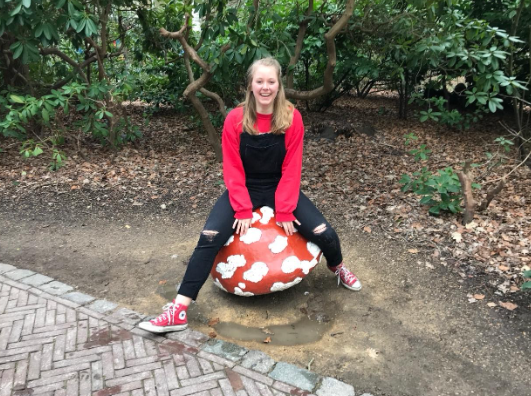Hello! I’m Fiep, a third year Forensic Science student at Kent. I’ve just returned from my amazing year in industry with the Netherlands Forensic Institute (NFI).
When I finished school, I wasn’t quite sure what I wanted to study and “do with the rest of my life”. I came across a UK university presenting Forensic Science while attending a fair for young adults which displays opportunities to study or work abroad. It combined all the things I wanted to be involved in when I was a child. I wanted adventure, I wanted crime, I wanted to mean something to the world. I feel the course brings all of that together through a vast variety of subjects, ways of approaching a problem and both theoretical and practical work. It’s safe to say I’m thoroughly enjoying this course.
I chose to study Forensics at Kent mainly because of a meeting I had with one of the lecturers, and how that meeting compared with lecturers I had met at other universities. I also chose Kent because Canterbury felt comfortable to move to, since I wouldn’t be able to go home very often (as I’m Dutch). The way the course is set up also suited my personal preference more than another uni I looked at, and of course, the fact that Forensics at Kent is accredited.
I think the University of Kent in general is a great uni due to its location. There are tons of green and nature spaces around and it has the most beautiful view of Canterbury. Additionally, it’s close to the beach and London. Besides its location, Kent offers a great variety of societies to join, from sporting societies to educational ones to religious societies. The School of Physical Sciences, which Forensic Science is a part of, is also particularly good. They seem to really take feedback into account and try their best to accommodate students the best they can.
During my year in industry I was able to work on three projects regarding DNA. I learnt so much during my year in industry, I found it truly invaluable. I feel comforted having more in depth knowledge and experience about what my life could be after I finish uni. I also really enjoyed networking with professionals and picking their brain whenever I could. Now, whenever my lecturers mention DNA, I can place it in a deeper context and thus appreciate the lecture material better. Also, it was a great opportunity to explore if the working life suits me (though with very little responsibility compared to a real job) and how it compares to uni-life.
I would definitely recommend going after a year in industry. Besides the fact that you’ll graduate with kickass experience on your CV, it adds a dimension to the course that goes beyond what any university can provide. If you are considering applying for a year in industry, I would advise you to take up any advice you can get from the people running the year in industry program and definitely have your CV and cover letter looked over by someone from either the year in industry program or from the careers and employability service.
Additionally, if you get an internship somewhere, don’t worry about having to ace everything right away. An internship is an experience for you to learn on the job, not for you to show up knowing how to do the job. You will probably make some mistakes here and there and receive some feedback on how to approve. I cannot stress this enough, you are there to learn and your efforts will be beneficial for yourself and for the company. It’s a great time, truly (and if it isn’t a great time, you can always come back to do your third year anyway).
I’m also asked to discuss any challenges I have faced so far, and how I’ve overcome these. I feel, however, that that is very personal in the way that there is no “one size fits all” solution to “challenges at uni”. Personally, I just ask for help when I feel like I need it (which is quite often tbh) and I am not ashamed to do so. It can be hard to figure out where to start when asking for help. When it comes to uni things (planning, concessions, general overwhelmedness) you can go to a variety of people. For module related issues, you can go to the lecturer or send them an email, or contact a student/peer mentor who might be able to help. For mental illness help I’ve visited Student Support and Wellbeing. They’re very willing to help and guide you. It can be daunting to just randomly go talk to them, so having a chat with your academic advisor can really help to get you to the right person. Academic advisors are also your go-to point of contact for ANY problem you might be facing, but another option is to speak to your favourite lecturer who will be equally able and willing to help. Challenges are very personal and difficult to navigate. I’ve just decided to stick with it, ask for help and accept my limitations. There is always someone you can reach out to (though that is sometimes the hardest step) and if you can’t, at that time, figure out who to reach out to, my advice is to go to sleep (or watch Netflix and eat lots of sugar/carbs) and try again tomorrow.

